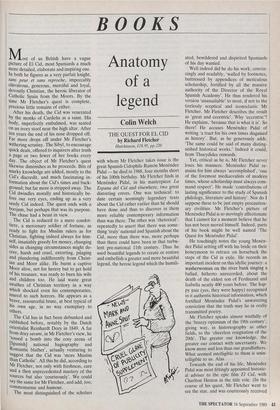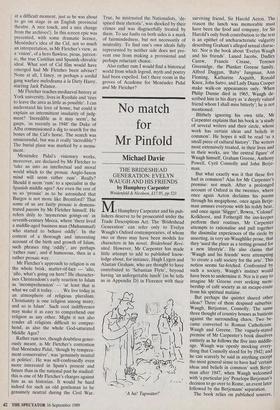BOOKS
Anatomy of a legend
Colin Welch
THE QUEST FOR EL CID by Richard Fletcher
Hutchinson, £18.95, pp.220
Most of us British have a vague Picture of El Cid, most Spaniards a much more detailed, elaborate and inspiring one. In both he figures as a very parfait knight, sans peur et sans rep roche, impeccably chivalrous, generous, merciful and loyal, devoutly Christian, the heroic liberator of Catholic Spain from the Moors. By the time Mr Fletcher's quest is complete, precious little remains of either.
After his death, the Cid was venerated by the monks of Cardena as a saint. His body, imperfectly embalmed, was seated on an ivory stool near the high altar. After ten years the end of his nose dropped off. Far more drops off under Mr Fletcher's Withering scrutiny. The Sibyl, to encourage quick deals, offered to inquirers after truth a page or two fewer of her books every day. The object of Mr Fletcher's quest likewise diminishes as he proceeds. Bits of murky knowledge are added, mostly to the Cid's discredit, and much fascinating in- formation about the Cid's times and back- ground; but far more is stripped away. The Cid dwindles morally and historically be- fore our very eyes, ending up as a very seedy Cid indeed. The quest ends with a boojum, but perhaps that was its purpose. The chase had a beast in view.
. The Cid is reduced to a mere condot- tiere, a mercenary soldier of fortune, as ready to fight for Muslim rulers as for Christian, fighting indeed always for him- self, insatiably greedy for money, changing Sides as changing circumstances might de- cree, harsh and cruel, extorting, pilaging and plundering indifferently from Christ- ian and Moor alike. He burnt a captive Moor alive, not for heresy but to get hold Of his treasure, was ready to burn his wife and children too. He laid waste great swathes of Christian territory in a way Which shocked even his contemporaries, inured to such horrors. He appears as a brave, resourceful brute, at best typical of his own age, in no way exemplary to Others.
The Cid has in fact been debunked and rubbished before, notably by the Dutch orientalist Reinhardt Dozy in 1849. A far from dozy savant, in Mr Fletcher's view, he tossed a bomb into the cosy arena of [Spanish] national hagiography and Romantic blather', actually venturing to suggest that the Cid was 'more Muslim than Catholic'. All this he did, according to Mr Fletcher, not only with freshness, care and a then unprecedented mastery of the sources but also 'courteously'. We could say the same for Mr Fletcher, and add, too, Commonsense and humour.
The most distinguished of the scholars with whom Mr Fletcher takes issue is the great Spanish Cidophile Rankin Menendez Pidal — he died in 1968, four months short of his 100th birthday. Mr Fletcher finds in Menendez Pidal, in his masterpiece La Espana del Cid and elsewhere, two great distorting errors. One was technical: to date certain seemingly legendary texts about the Cid rather earlier than he should have done and thus to discover in them more reliable contemporary information than was there. The other was 'rhetorical': repeatedly to assert that there was some- thing 'truly' national and Spanish about the Cid, more than there was, more perhaps than there could have been in that turbu- lent pre-national 11th century. Thus he used beautiful legends to create or restore and embellish a greater and more beautiful legend, the heroic legend which the humili- ated, bewildered and dispirited Spaniards of his day wanted.
Well indeed did he do his work, convin- cingly and readably, 'walled by footnotes, buttressed by appendices of meticulous scholarship, fortified by all the massive authority of the Director of the Royal Spanish Academy'. He thus rendered his version 'unassailable' to most, if not to the tirelessly sceptical and iconoclastic Mr Fletcher. Mr Fletcher describes the result as 'great and eccentric'. Why 'eccentric'? He explains, 'because that is what it is'. So there! He accuses Menendez Pidal of writing 'a tract for his own times disguised as history'. But, as he generously adds, 'The same could be said of many disting- uished historical works.' Indeed it could, from Thucydides onwards.
Yet, critical as he is, Mr Fletcher never loses his manners. Menendez Pidal re- mains for him always 'accomplished', 'one of the foremost mediaevalists of modern times, whose scholarship must always com- mand respect'. He made 'contributions of lasting significance to the study of Spanish philology, literature and history'. Nor do I suppose these to be just empty precaution- ary civilities. Mr Fletcher's picture of Menendez Pidal is so movingly affectionate that I cannot for a moment believe that he has not been moved himself. Indeed, parts of his book might be well named 'The Quest for Menendez Pidal'.
He touchingly notes the young Menen- dez Pidal setting off with his bride on their honeymoon to retrace on horseback the steps of the Cid in exile. He records an important incident on this idyllic journey: a washerwoman on the river bank singing a ballad, hitherto unrecorded, about the death of the eldest son of Ferdinand and Isabella nearly 400 years before. The hap- py pair (yes, they were happy) recognised in it authentic historical information, which fortified Menendez Pidal's unwavering conviction that the truth may lie in orally transmitted poetry. Mr Fletcher speaks almost wistfully of the 'breezy optimism of the 19th century', giving way, in historiography as other fields, to the 'cheerless resignation of the 20th'. The greater our knowledge, the greater our contact with uncertainty. We know more and less than our grandfathers. What seemed intelligible to them is unin- telligible to us. Alas . . Towards the end of his life, Menendez Pidal was most fittingly appointed historic- al adviser to the epic film El Cid, with Chariton Heston in the title role. (In the course of his quest, Mr Fletcher went to see the star, and was courteously received at a difficult moment, just as he was about to go on stage in an English provincial theatre. A nice touch, and a nice change from the archives!). In this screen epic was presented, with some dramatic licence, Menendez's idea of the Cid, not so much an interpretation, in Mr Fletcher's view, as a 'vision', of a hero flawless, pious, patriot- ic, the true Castilian and Spanish chivalric ideal. What sort of Cid film would have emerged had Mr Fletcher been adviser? None at all, I fancy, or perhaps a sordid gang warfare melodrama et la Dirty Harry, starring Jack Palance.
Mr Fletcher teaches mediaeval history at York university, lives in Ryedale and 'tries to leave the area as little as possible'. I can understand his love of home, but could it explain an intermittent insularity of judg- ment? `Incredible as it may seem', he gasps, 'as recently as 1948' the Duke of Alba commissioned a dig to search for the bones of the Cid's horse. The search was unsuccessful, but was it really 'incredible'? The burial place was marked by a monu- ment.
Menendez Pidal's visionary works, moreover, are declared by Mr Fletcher to 'take us into an intellectual and moral world which to the prosaic Anglo-Saxon mind will seem rather rum'. Really? Should it seem 'rum' to a specialist in the Spanish middle ages? Are even the rest of us so 'prosaic' as to be astonished that Burgos is not more like Brentford? That some of us are fairly prosaic is demons- trated passim by Mr Fletcher himself. He refers drily to 'mysterious goings-on' in seventh-century Mecca, where 'there lived a middle-aged business man (Muhammad) who started to behave oddly'. In the context of a thorough and interesting account of the birth and growth of Islam, such phrases ring 'oddly', are perhaps 'rather rum', and if humorous, then in a rather prosaic way.
Mr Fletcher's approach to religion is on the whole brisk, matter-of-fact — 'allo, 'allo, what's going on here? He character- ises Christendom's early reaction to Islam as 'incomprehension' — 'at least that is what we call it today. . . . We live today in an atmosphere of religious pluralism. Christianity is one religion among many, and so is Islam'. Such cool indifference may make it as easy to comprehend one religion as any other. Might it not also render all religions difficult to compre- hend, as also the whole God-saturated Middle Ages?
Rather rum too, though doubtless gener- ously meant, is Mr Fletcher's contention that Menendez Pidal, 'though by tempera- ment conservative', was 'genuinely neutral in politics'. He was self-confessedly even more interested in Spain's present and future than in the national past he studied: this is one of Mr Fletcher's charges against him as an historian. It would be hard indeed for such an old gentleman to be genuinely neutral during the Civil War. True, he mistrusted the Nationalists, 'de- spised their rhetoric', was shocked by their crimes and was disgracefully treated by them. To see faults on both sides is a mark of fairmindedness, but not necessarily of neutrality. To find one's own ideals fully represented by neither side does not pre- vent one from making a provisional and perhaps reluctant choice.
Also rather rum I would find a historical world from which legend, myth and poetry had been expelled. Isn't there room in the groves of Academe for Menendez Pidal and Mr Fletcher?



































































 Previous page
Previous page